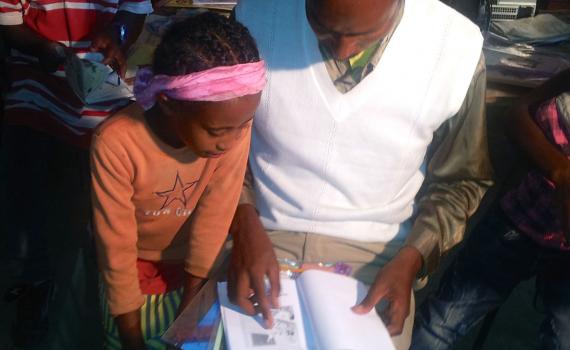
COMMUNITY NEED
In 2010, research conducted by USAID into children’s reading performance at primary schools in Ethiopia found that a third of children in second grade and a significant number of third-graders could not read at all. The findings led to urgent nation-wide efforts to address child literacy, including establishment of kindergartens and pre-school literacy programmes at kindergartens. However, kindergartens still absorb less than 14% of Ethiopia’s 7.5 million pre-school children (Ministry of Education, 2012). In addition, Ethiopia lacks mother-tongue reading materials for young children.
THE INNOVATIVE PROJECT
CODE-Ethiopia’s Ebooks and Family Literacy pilot project seeks to address these issues by creating opportunities for early literacy development in community libraries, using technology. With a small grant from the EIFL Public Library Innovation Programme (up to US$20,000), CODE-Ethiopia equipped three rural community libraries, in Fiche, Durbete and Dire Dawa, with desktop computers, a projector and projection screen, and initiated a technology, family literacy and e-books development training programme for community librarians.
ACHIEVEMENTS AND IMPACT
CODE-Ethiopia increased availability of reading materials for pre-school children by creating new story and picture books in print and electronic formats in Amharic, which is Ethiopia’s official language, and Afaan Oromoo, the mother tongue of over 30 million Ethiopians.
The organization also trained six community librarians in the three rural communities to use digital technology and the new books in family literacy sessions. The three community libraries worked with over 40 families – fathers, mothers and children – teaching parents to read with their children and to interact with their children around books.
The pilot project succeeded in improving children’s early literacy skills in the three communities: assessments conducted by CODE-Ethiopia found that print awareness of children who took part in the project increased from 54% to 78%. Print awareness is a child’s earliest understanding that written language carries meaning, and children who have good print awareness are more likely to succeed in learning to read.
Based on the success of the pilot project, CODE-Ethiopia has built skills of community librarians at 22 more libraries from across the country to offer family literacy sessions, and is discussing further scale-up of the project.
EIFL-PLIP PROJECT TIMELINE
May 2014 – June 2015.
ABOUT CODE-ETHIOPIA AND THE THREE COMMUNITY LIBRARIES
CODE-Ethiopia is a non-governmental organization that works through a network of 97 community libraries to promote literacy in Ethiopia. The three libraries that took part in the pilot project serve farming communities in densely populated rural areas. Each library attracts an average of 85 people a day. The libraries provide access to print resources; support students who are conducting research and doing homework, and promote literacy.
ADDITIONAL RESOURCES
Read a two-page case study about CODE-Ethiopia’s Ebooks and Family Literacy pilot project.
MORE PUBLIC LIBRARIES SUPPORTING EDUCATION
Read about more innovative public library services supporting education of children and adults. PLIP-EDUCATION





